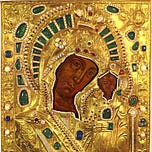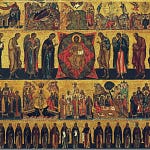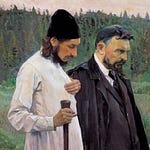22 October / 4 November
Today the Church celebrates the Icon of the Mother of God found in the town of Kazan after the town burnt in the year 1579. Kazan was one of the political centers of the Golden Horde. It was populated by the Bulgar and Kipchak peoples and was repeatedly ravaged by the Mongols, but at the break-up of the Golden Horde, Kazan became the capital of the Kazan Khanate under Khan Ulugh. In 1552, Ivan IV the Terrible occupied Kazan, thus securing the entirety of the Volga River for the Tsardom of Moscow and enabling further Russian expansion into Siberia.
In 1579, a great fire burnt half of the city. Soon after, a nine-year-old daughter of one of the Russian soldiers stationed in Kazan saw the Mother of God in a dream and was shown the place where the Icon could be found. The girl and her mother dug in the place shown in the vision and indeed found the Icon, which was carried to the city’s cathedral built earlier by Ivan IV. A copy of the Icon was immediately commissioned and sent to Moscow, where it arrived in the same year. When Tsar Ivan learnt the story of the finding of the Icon, he ordered that a church and a convent be built at the place where the Icon was found. Both the girl and her mother later became monastics at the new convent.
Approximately 40 years later, in 1610, Moscow was occupied by Polish and Lithuanian forces. Polish King Sigismund III intended to enthrone his son Władysław in Moscow, but Russian Cossacks led by Prince Trubetskoy besieged the occupied city in 1611 and cut off food supplies to the Polish garrison confined within the Kremlin. In 1612, forces from various parts of the Tsardom gathered near Moscow; among them was a contingent from Kazan which brought a copy of the Kazan Icon of the Mother of God. In October of 1612, Moscow was taken back, ending the Polish occupation and leading to the election of Mikhail Romanov, the first of the Romanovs, to become the new tsar.
Listen to this episode with a 7-day free trial
Subscribe to Phroneo to listen to this post and get 7 days of free access to the full post archives.












